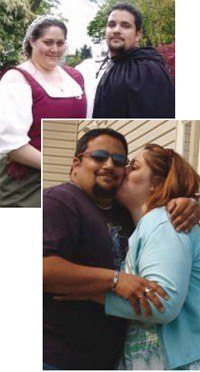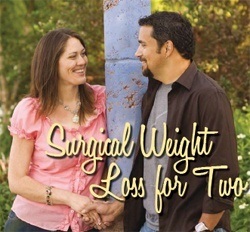Dr. Chebli in the News
Surgical Weight Loss for Two
 For Traci Bradford, the worst part of being morbidly obese was falling. At more than 300 pounds, she was scared to walk down stairs for fear that she would fall. Traci also suffered from serious health problems related to her obesity, including asthma, sleep apnea, acid reflux and chronic knee pain.
For Traci Bradford, the worst part of being morbidly obese was falling. At more than 300 pounds, she was scared to walk down stairs for fear that she would fall. Traci also suffered from serious health problems related to her obesity, including asthma, sleep apnea, acid reflux and chronic knee pain.
Traci's husband, Aaron Baca, also obese, had a list of health issues as well, ranging from high blood pressure and a fatty liver to sleep apnea and constant back pain. "I was tired a lot, depressed and embarrassed to be in my own skin," Aaron recalls. "I didn't feel like part of society, and I didn't feel I was gettingeverything I could out of life.
The young Everett, WA couple met online ten years ago, and started dating four years later. Aaron says,"I call her my prom queen, because everyone always has such good things to say about her." When they married, Traci and Aaron felt like best friends, so when it became clear that they shared the serious problem of obesity, they approached finding a solution together. "Both of us had lost weight through diets and exercise at least twice, but gained it all back and then some," Traci says. "In 2003, my dad had gastric bypass surgery. I was amazed at the change in him. That sort of planted the seed to at least look into the surgery." Traci says she and Aaron both had issues with food that were negatively affecting every aspect of their lives. "I would push food away all day, and when I was able to retreat at the end of the day, I'd have a huge meal," she says. Aaron recalls that he was using food as support - a way to help him deal with stress, happiness or any other strong emotion. The pair decided to start researching bariatric, or weight loss, surgery. Some of their first calls were to their health insurers, to make sure the surgery was covered. Then, they found Dr. Joseph Chebli online. "We knew about Northwest Hospital, and we were impressed by Dr. Chebli's outstanding reputation. We went to one of the informational meetings he offers every month and we made an appointment for a consultation."
When the couple met with Dr. Chebli, who serves as medical director of the Northwest Hospital Bariatric Surgery Program, he explained the strict qualifications that morbidly obese patients must meet to become surgical weight loss candidates.
First, the patient's body mass index (BMI) - or the relationship between weight and height - must be greater than 40. A qualifying BMI may also be greater than 35 if it's accompanied by at least one high-risk medical problem associated with morbid obesity. These medical problems can include Type 2 diabetes, high blood pressure, obstructive sleep apnea, infertility, high cholesterol or a host of other conditions.
Second, the patient must be emotionally stable, highly motivated, and must have failed at weight control through diet and exercise alone. Even with the surgery, says Dr.Chebli, being thin and fit forever is not a guarantee. "We provide a sort of level playing field for the patient after surgery, along with strong nutritional and emotional support. Ultimately, though, I think the patient has everything to do with success or failure," he says. "Surgery gives our patients a strong metabolic advantage, probably for the first time. But success really depends on their ability to make dietary and behavior changes, and a long-term promise to themselves to exercise. It's a lifetime follow-up and it's a lifetime commitment." Traci and Aaron made that commitment, to themselves and to each other. Aaron says, "Once we started traveling down that road, I'd go online every night before bed and research different aspects of the surgery, from its effect on organs to the importance of diet and exercise both before and after."
Aaron and Traci worked hard to achieve their pre-surgery weight loss goals, and finally had their procedures in the summer of 2008. "Aaron and Traci both had laparoscopic gastric bypass surgery, or what's technically known as a Roux-en-Y procedure," says Dr. Chebli. During Roux-en-Y, Dr. Chebli gives the patient a smaller stomach pouch — a procedure known as gastric restriction - and reconstructs the intestinal tract. This intentionally restricts the amount of food the patient can consume and how much the body can absorb.
"Our stay at Northwest Hospital was great. The private rooms had beds specifically for bariatric patients," Traci says. "Our care was totally integrated, and everyone on the nursing staff was really nice, like they were taking care of members of their own family."
Traci's bubbly personality shone through to Northwest Hospital staff as well. Carmela Pontillo RN, coordinator of the Bariatric Surgery Program, recalls that once Traci was up and walking, she spread lots of smiles. "She was out walking the hall wearing huge pink-and-white bunny slippers, large gold-sequined Minnie Mouse ears and sunglasses. Other patients couldn't help but grin."
Despite all the research, Traci and Aaron still remember feeling overwhelmed once they left the hospital. They turned to Dr. Chebli and the bariatric surgery team for information, support and friendship as they worked toward their longterm goals. "Fortunately, we could call Dr. Chebli any time," Traci says, "and they gave us a big binder of information on what to eat, what to expect and so on." The pair also relied on dietitian Tricia Clement, RD, who was only an email away with solutions to nutrition questions.
Traci and Aaron joined Northwest Hospital's bariatric support group, which meets once a month. Aaron says it gives him a chance to connect with others who've had the same experience. The couple put their enthusiasm to work in the group, making themselves available to people who were considering the surgery. They also joined a hiking club set up by another support group member. "We go twice a month," Traci says. "The hikes are from three to four hours long, and alternate between easy and challenging." Traci and Aaron also set up a Facebook support group that includes information about the surgery, the hiking club and Aaron's band, Spin Cycle. Members of the online support group often come out to dance at Aaron's gigs. "It's more exercise!" says Traci.
 In the year since their bariatric surgery, Aaron's and Traci's lives have changed in many ways. They walk a lot more and train with free weights. Aaron has lost 135 pounds, or 86.7% of his excess weight, and Traci has lost 161 pounds, or 95% of her excess weight. The biggest changes, though, aren't on the outside. Traci's health issues have disappeared. She has no acid reflux, doesn't need asthma medicine and stairs don't scare her anymore. Aaron's health issues have disappeared, too, and he says he has a lot more energy. "At some point, you have to learn how to deal with life instead of hiding behind food or something else that makes you feel better for a little while, but ultimately gives you nothing," he says. Traci adds, "The surgery gives you this tool and you have to train your body to use it. The surgery isn't a miracle cure. You have to exercise and teach yourself healthy eating habits."
In the year since their bariatric surgery, Aaron's and Traci's lives have changed in many ways. They walk a lot more and train with free weights. Aaron has lost 135 pounds, or 86.7% of his excess weight, and Traci has lost 161 pounds, or 95% of her excess weight. The biggest changes, though, aren't on the outside. Traci's health issues have disappeared. She has no acid reflux, doesn't need asthma medicine and stairs don't scare her anymore. Aaron's health issues have disappeared, too, and he says he has a lot more energy. "At some point, you have to learn how to deal with life instead of hiding behind food or something else that makes you feel better for a little while, but ultimately gives you nothing," he says. Traci adds, "The surgery gives you this tool and you have to train your body to use it. The surgery isn't a miracle cure. You have to exercise and teach yourself healthy eating habits."
Now with healthier lives and bodies, the couple feels like nothing is holding them back, either at work or personally. Traci is finishing her bachelor's degree, and hopes to attend law school. Aaron says he's looking for more physical challenges, and is looking at returning to school too.
Traci and Aaron also look forward to return appointmentswith Dr. Chebli, who provides important long-term follow-up. They talk with him about how their lives are changing, what to expect next and what new challenges they plan to take on. "Dr. Chebli has become a reliable friend, someone we can really count on," says Aaron.
For more information on the Northwest Hospital Bariatric Surgery Program, call (206) 368- 1350. Or visit www.nwhospital.org/bariatric, to calculate your BMI, and to learn about informational seminars and support groups, the bariatric surgery team, and the program's integrated, personalized approach to care.
Click here to read entire story.
